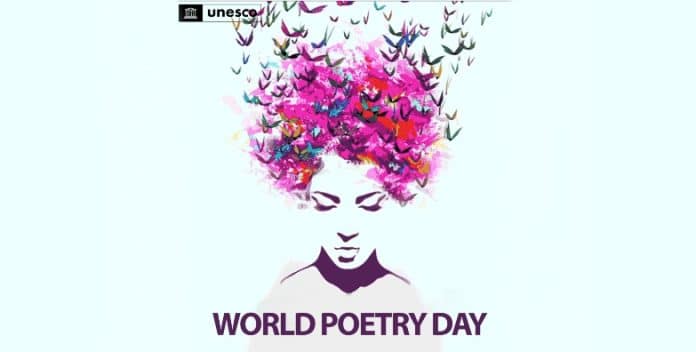“Translating poetry is the opposite of war” – Sarah Maguire
Poetry has the power to express the inexpressible; to capture emotion; to shock, console, move, and transport us to another place and time. As one of the oldest forms of human expression, poetry is the common link between us and our ancestors in every culture and on every continent across the world.
When UNESCO first adopted 21 March as World Poetry Day in 1999, it was to support linguistic diversity through poetic expression and increase the opportunity for endangered languages to be heard. Linguistic diversity is a challenge when it comes to poetry; much of what makes poetry remarkable also makes it difficult, if not impossible to translate. How do you replicate a rhyme, or convey the many connotations of a single word? We may well have heard of William Wordsworth, Dylan Thomas, Robert Burns and William Butler Yeats, but our horizons are often limited to the poetry written in our mother tongue, while poetic voices from farther afield go unheard.
The Poetry Translation Centre is an organisation attempting to change that. Bringing together leading contemporary poets from Africa, Asia and Latin America with language experts and prominent UK poets, the Centre produces translations which introduce their work to new audiences while respecting the integrity of the original.
For World Poetry Day 2022, UNRIC spoke to Bern Roche Farrelly, Communications Programme Manager at The Poetry Translation Centre, about the work they do and the importance of celebrating translated poetry.
What was the initial impetus for setting up The Poetry Translation Centre?
The Poetry Translation Centre was founded by the poet Sarah Maguire in 2004. She had two things in mind: she wanted to translate poetry from Asia, Africa and Latin America as a way of connecting with diaspora communities in the UK, for whom poetry is often incredibly important; and she wanted to ferment change within British poetry, by infusing it with influences from around the world.
Why is it important that we translate poetry?
It is always important to translate poetry. Often these days it feels like the world is in a moment of particular crisis. Going back to Sarah Maguire, she once said that ‘translating poetry is the opposite of war.’ I have always taken this to mean that the efforts of empathy, understanding and imagination that are required to translate poetry are the antithesis of the brutal, shortlisted failure of thought that leads to war.
Ultimately, translation allows us to see the world from within a different experience. In an English poem, grey clouds and rain suggest sorrow, but in a Somali poem, a downpour indicates joy because in the desert you wish for rain and it brings life. Translated poetry offers a multitude of additional worlds to live in.
Your website includes three versions of many of the poems: the original, an initial close translation and a final poetic translation. Why is that?
Having the different versions of each poem on the site helps highlight the translation process. Translators are often rendered invisible, uncredited, undervalued and underpaid, so showing the different stages between the original and the new English version is important. We also hope that by showing the process we highlight that there is no definitive translation; we are saying this is a version, but translation is open-ended.
You also run workshops to produce collaborative translations of new poems. What is that process like?
Our collaborative translation workshops are at the core of what we do. It can feel like alchemy, witnessing a group of people, sometimes total strangers, around a table, take a poem, gently unweave the sentences, words, shades of meaning and particularities of grammar only to reassemble it in a second language.
The care it takes to do this is valuable in itself, the recognition that, while on one hand, it is impossible to translate poetry, something is always lost or changed, it is also necessary to translate poetry, to try to understand one-another deeply, across our subjective perspectives, cultural and linguistic boundaries.
Through the workshops, I have come to see translation not just as a technical process but as a way of seeing the world, one that celebrates difference and seeks to understand.
“Poetry presents us with a sense of truth” – Charlotte Shevchenko Knight
UNRIC also spoke to one of The Poetry Translation Centre’s contributors, British-Ukrainian poet Charlotte Shevchenko Knight, about the importance of poetry in the current climate.
What role does poetry play for you in terms of documenting or processing current events?
Poetry, to me, has always been the space where truth can exist in its myriad of forms. Amongst the hoards of propaganda and misinformation disseminated today, don’t we all yearn for a sense of truth? Poetry presents us with just that.
In my own writing, I explore the folds of truth within which my family, and Ukraine’s, history exist. This comes from a longing for truth, which as many Ukrainians will know, is often obscured in our history. It was only logical for me to continue to write now, during a time of conflict, not because I long for truth, but because I long for others to understand it. I’m sure that many other writers feel this way too.
Why is it important in this day and age that we continue to read, translate and share poetry?
I think the reason it is so important to read poetry in translation today is to understand the nuances of the form, to understand the role of poetry in other cultures, and to understand other’s perspectives. Poetry, ultimately, comes from a place of great feeling and empathy. Our reading of this should extend from beyond our own doorstep.
Additional links to Charlotte Shevchenko Knight’s social media channels: on Twitter and Instagram.
The Poetry Translation Centre:
Twitter – https://twitter.com/PoetryTranslate
Facebook – https://www.facebook.com/poetrytranslation
Instagram – https://www.instagram.com/poetry_translation/
The Dual Poetry Podcast – https://soundcloud.com/poetrytranslationcentre



